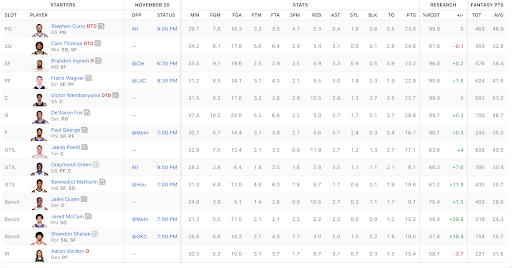It’s Sunday night, and Mason McNiell (11) is sitting at the edge of his seat, waiting, watching his computer screen closely. Seconds later, Victor Wembanyama’s name highlights orange on the screen, and McNiell’s eyes light up. 731 miles away, in San Antonio, Wembanyama steps off the bench and onto the court. There is only one minute left in the game. Wembanyama is McNiell’s last chance at winning his weeklong matchup — he only needs a few more points to win, and Wembanyama is the last player on his roster who is scheduled to play. Chris Paul drives into the paint to face lockdown defense, and passes it back to Wembanyama. He looks at the rim, takes a step back and shoots. A green “+3” floats across McNiell’s screen. He breathes a sigh of relief. Now two points above his opponent, he is safe for the week.
Fantasy leagues offer communities of fans the chance to track players’ stats, make friends and compete. Participants in fantasy leagues draft players from various teams at the beginning of a season and are matched up to face other members of their leagues weekly. The player with the most points by the end of the week wins, and at the end of the season, a champion is declared, along with a loser, who places at the bottom of the league.
“I like … the thrill of everyday competition with friends,” McNiell said. “It makes every game matter so much more. It also helps enhance your current basketball knowledge and understanding of the modern NBA.”
Despite containing an element of luck, fantasy basketball requires careful planning and strategy. First, fantasy players must draft for players who will earn them the most points possible while also looking out for injury-prone players. Trades can also add a layer of complexity to the fantasy experience, as players can be swapped from team to team throughout the entire season. Additionally, during matchups, fantasy managers must decide which players will be benched and which players will earn points. A misstep could cost a team the entire matchup.
“I wasn’t able to set my lineup [because I was traveling],” Daniel Collins (11) said. “I ended up losing out on almost 100 fantasy points. Then, two of my players got injured, which lost me 60 or so [points] … I would’ve won that week.”
While winning and losing a matchup may seem trivial, the stakes are often high. In many leagues, there is a tradition of setting a punishment for the bottom ranked player at the end of the season. These punishments can range in consequence; some may be physically painful, while others involve public humiliation.
“The loser of the league … has to post themselves singing [a] song of the league’s choosing on their Instagram,” McNiell said. “Initially, I was afraid, but I’m the best team in the league, so no.”
Player injuries have the potential to devastate a fantasy team’s prospects of winning. If a player is injured, they will score no fantasy points, crippling a team permanently.
“[The week I played Garrett Chaudron] all of his star players were out,” Henry Chipley (11) said. “Ja Morant, Zach Edey, Jaren Jackson Jr., they were all out. [Because of that], I was able to make a 300 point comeback on the last day of the week.”
That dramatic comeback, fueled by the absence of key players, became a memorable event in Chipley’s fantasy sports experience. It wasn’t just about the points — it was about the connection to individual athletes and how their performances could directly impact his success.
“[Fantasy basketball] enhances my experience [as a fan] because it leads me to cheering on mainly just players in hopes of them doing well,” Chipley said.



































